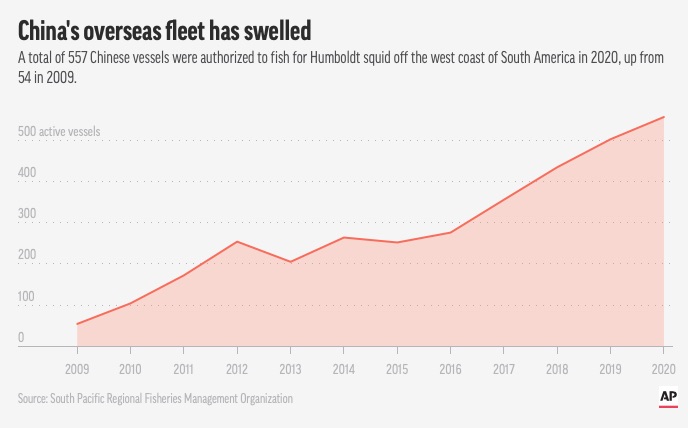
Image: Screenshot
With the United Nations Climate Change Conference (COP26) coming up in a month in Glasgow, Scotland, global warming and environmental damage have been on the main agenda for news organizations around the world. Tracking the most popular data journalism stories on Twitter from September 20 to September 26, using NodeXL mapping and our own human curation, we also found investigations into burning oil in the Greek islands, heat-related deaths in Germany, China’s vast fishing fleet, the US murder rate, and anomalies in the recent Russian election.
China’s Sea Power
Last year, satellite data showed several hundred Chinese ships fishing for squid near Ecuador’s Galapagos archipelago, a UNESCO world heritage site. The discovery prompted more debate about the threat of overfishing, especially in an area home to giant tortoises, hammerhead sharks, and other endangered species. To observe the Chinese fleet, the Associated Press and Spanish-language broadcaster Univision spent 18 days on the high seas earlier this year. Journalists analyzed more satellite and fishing data to examine the environmental impact of China’s sea operations.
The @AP and @Univision spent 18 days on the high seas off South America this summer, observing China’s distant water fishing fleet, the largest in the world. https://t.co/XXiHIOrTha
— The Associated Press (@AP) September 24, 2021
Border Refugees
Migration continues to be a major issue for US authorities despite the Biden administration’s move to undo hardline policies by his predecessor, former President Donald Trump. One public health policy, which Biden hasn’t reversed, allows authorities to deny migrants a chance to claim asylum, and fly them back to their homeland. Reuters analyzed data by the US Customs and Border Protection agency to investigate how many migrants have been expelled under the so-called Title 42 public health policy.
President Biden promised to reverse many of the hardline policies of President Trump, but kept in place a sweeping public health policy known as Title 42, which allows many migrants caught at the border to be expelled without a chance to claim asylum.https://t.co/WhuqMgiayY
— Reuters Graphics (@ReutersGraphics) September 23, 2021
Burning Oil
Last year, Greek GIJN member Reporters United joined with Investigate Europe to publish an investigation that shows how the European Union has sabotaged its own climate goals with massive fossil fuel subsidies. In a follow-up to that project, the team focused on the Greek islands, which are cut off from the country’s main power grid, and need to rely on oil generators that cost billions of euros to run.
#JustPublished The Greek islands have remained cut off from the country’s main power grid for decades. They run on oil generators that cost billions of €. Why? Read our copublication with @reporters_gr to discover the few winners & many losers.https://t.co/ARR8S5Ldns
— Investigate Europe (@investigate_eu) September 21, 2021
Internet Speed in Europe
If you live in a European city, chances are you enjoy robust internet speed. An analysis by Osservatorio Balcani Caucaso Transeuropa, published by the European Data Journalism Network, found that internet performance has improved significantly over the past 18 months. But reporters also found that the gap between urban and more rural areas has increased, too. This type of regional inequality can seriously affect business, education, and other areas of social life.
📈 Over the last year and a half, internet speeds in Europe have increased by more than fifty percent. pic.twitter.com/T5qxdgWSPy
— European Data Journalism Network (@EdjNet) September 22, 2021
Afghanistan’s Mineral Resources
In 2019, Afghanistan’s Ministry of Mines and Petroleum published a report revealing what many analysts have long suspected: that the desperately poor nation holds as much as $1 trillion-worth of untapped mineral resources. But investors and experts told Al Jazeera that poor security, weak legislation, and corruption have prevented the development of the mining sector. Now that the Taliban has taken control of the war-torn country, the outlet’s graphics team produced this visual piece to illustrate the scale of the reserves and their geographical location.
Deep beneath the ground in one of the world’s poorest countries sits at least $1 trillion of untapped mineral resources.
We break down #Afghanistan's vast mineral wealth in 6 graphics.
Latest on @AJLabs @AJEnglish with @muh_hossein #ddjhttps://t.co/LC3NvZRwfD pic.twitter.com/BaKrYpVLQO
— Mohammed Haddad (@haddadme) September 24, 2021
US Murder Rate
In 2020, the US saw the biggest rise in murders since the start of national record-keeping in 1960, The New York Times reported. Data collected by the FBI shows that — although the murder rate stands far below its historic peak in the 1980s — almost 5,000 more murders were committed last year compared to 2019, for a total of around 21,500. In around 77% of the cases, the perpetrator used a firearm. The Times’ Upshot team dove into the numbers, noting that the change in murder is “a national phenomenon and not a regional one.”
“Americans are in an arms race with themselves."
An estimated 17 million people — or about 6.5 percent of American adults — bought guns last year.
39 percent of American households now own guns, up from 32 percent in 2016.https://t.co/VXCE6ClVGW
— Mike Baker (@ByMikeBaker) September 22, 2021
Water Deficit
Palestinian families have suffered from severe water shortages for decades. When they don’t have enough water to supply their needs, some are forced to buy it from an Israeli company, Mekorot. Some cities on the West Bank are now dependent on Mekorot as their main source of water, according to an investigation by GIJN member Arab Reporters for Investigative Journalism (ARIJ). These water shortages have also prompted some Palestinians to buy allegedly contaminated mineral water from another Israeli company.
In #Palestine.. 🚰
Mahdi Daraghmeh and his 10 children receive water only once a week. He's forced to buy expensive water from the 'Mekorot' Israeli company that exploits over 600 million cubic meters of water from the West Bank.Read more about it here⬇️https://t.co/T2wkpS7TTd pic.twitter.com/O71k2Gbadz
— Arab Reporters for Investigative Journalism (@ARIJNetwork) September 24, 2021
German Heat Islands
Thousands of people are dying in Germany each year from the consequences of heat. Urbanization and rising temperatures due to climate change are exacerbating the problem. Bavarian Radio (BR) examined satellite images to illustrate so-called “heat islands,” which show German cities that are particularly hot.
Eine Auswertung von Satellitenbilder zeigt, wo sich deutsche Städte besonders aufheizen und wo sie umgebaut werden müssten, damit sie künftig lebenswert bleiben: https://t.co/KnptvQ9qPk #klimawandel via @br_data
— Steffen Kühne (@stekhn) September 20, 2021
Russian Election Anomalies
After President Vladimir Putin’s party United Russia won the recent elections to the State Duma in Russia, journalists and independent analysts expressed concerns about possible vote fraud. The claims are partly based on mathematical laws that usually impact turnout and voting results. While examining this data, iStories has detected some suspicious anomalies.
Какие выборы без вбросов? Никакие
ДАННОЕ СООБЩЕНИЕ (МАТЕРИАЛ) СОЗДАНО И (ИЛИ) РАСПРОСТРАНЕНО ИНОСТРАННЫМ СРЕДСТВОМ МАССОВОЙ ИНФОРМАЦИИ, ВЫПОЛНЯЮЩИМ ФУНКЦИИ ИНОСТРАННОГО АГЕНТА, И (ИЛИ) РОССИЙСКИМ ЮРИДИЧЕСКИМ ЛИЦОМ, ВЫПОЛНЯЮЩИМ ФУНКЦИИ ИНОСТРАННОГО АГЕНТАhttps://t.co/Sz60bP9CPu
— Важные истории (@istories_media) September 21, 2021
UK Benefits Challenges
In England, Scotland, and Wales, seven of every 10 appeals over rejected disability benefits were successful since 2018, according to an analysis by the BBC Shared Data Unit. In Northern Ireland, six out of 10 appeals over the past two years prevailed. But in the same period, hundreds of people suffering from disease or other maladies have died before having the chance to hear judges rule on their case.
"It was justice for my dad and to prove them wrong," said Kerry Jones. She won an appeal for her dad after his death about his benefits. He had mouth cancer but was refused PIP.
7 in every 10 tribunal appeals about #disabilitybenefits won since 2018 #ddj https://t.co/qXPDxDNzIW— Alex Homer (@alexhomer) September 24, 2021
Thanks again to Marc Smith and Harald Meier of Connected Action for gathering the links and graphing them. The Top Ten #ddj list is curated weekly.
 Peter Georgiev is GIJN’s social media and engagement editor. Previously, he was part of NBC News’ investigative unit in New York. He also worked as a correspondent for Bulgarian National Television and his reporting has been published by the Guardian, Deutsche Welle, and other international outlets.
Peter Georgiev is GIJN’s social media and engagement editor. Previously, he was part of NBC News’ investigative unit in New York. He also worked as a correspondent for Bulgarian National Television and his reporting has been published by the Guardian, Deutsche Welle, and other international outlets.

